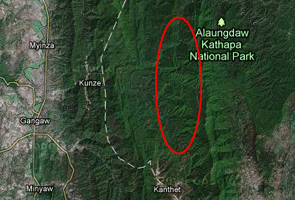Burma's ruling junta has finished construction work on three nuclear reactors in the country's north and will soon be ready to put them into operation, according to military sources at the elite Defense Services Academy (DSA) in Maymyo, Mandalay Division.
 |
 Enlarge Image Enlarge Image
A map showing the Pon Taung Pon Nya mountain range, the site of one of three nuclear reactors recently constructed by the Burmese junta. |
The nuclear reactors, which the regime claims are for research purposes, are located at Kyauk Pa Htoe, a village in Thabeikkyin Township, northern Mandalay Division; Maymyo Fifty Miles, an area some 80 km from the setting of the DSA; and Pon Taung Pon Nya, a mountainous area on the border between Magwe and Sagaing divisions.
“They [military leaders] chose Pon Taung Pon Nya because it is a safe distance from highly populated cities,” said a military official in Maymyo, also known as Pyin Oo Lwin.
According to local residents, the site is about 30 km from the village of Kyaw in Gantgaw Township, situated on the Pakokkuu-Kalay railway line in Magwe Division.
“Since the project started in 2007, there have been many foreigners who look like they might be Chinese coming and going,” said a local source living in Kyaw.
“We are not allowed to go anywhere near this area built for military use,” the source added.
Although there has been confirmation that construction work on the projects has been completed, it remains unclear how soon the reactors will be ready to go online. However, a recent flurry of activity, including high-level visits by senior members of the ruling regime, suggests that the reactors will soon be ready for use, according to military sources.
The sources say that Vice Sen-Gen Maung Aye, the junta's No. 2, has made frequent trips to the DSA in Maymyo in recent months to meet with Maj-Gen Sein Win, the head of the Directorate of Defense Services Science and Technology Research, which is responsible for Burma’s nuclear program.
According to Ye Htet, a former lieutenant who defected from the Burmese military while studying for a graduate degree at the DSA, the regime has invested heavily in the project with an eye to early completion. He said the junta has sent around 6,000 military officials to Russia to study nuclear technology.
“The project is at least half finished,” said Ye Htet, who fled to Mae Sot, on the Thai-Burmese border, earlier this year.
The technology for Burma’s nuclear research project was provided by Russia’s Federal Atomic Energy Agency (RFAEA), which agreed in May 2007 to help design and build a 10-megawatt light-water reactor using 20 percent enriched uranium-235 fuel.
However, the Russian agency has since distanced itself from the Burmese nuclear program. This has led to fears that the regime has turned to North Korea for assistance in achieving its nuclear ambitions.

 Enlarge Image
Enlarge Image